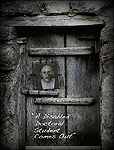|
Like a house of mirrors, you can't hide from your hidden disabilities forever. Once you catch a glimpse of yourself, you wonder how you ever missed it. Ignorance? Distractions? Denial? Others around you uncomfortable telling you? When your mental and emotional disorders are no longer hidden from you, they feel obvious, like the kind of disabilities that were in sideshows or "Ripley's Believe it or Not" books. Sleep is beautiful because you are no longer conscious of your pain. But sometimes it's
hard to stay asleep when you are awake. And then again, there are those who master
it without even realizing it: they're "sleepwalking."
|
|
|
ADHD and learning disabilities were the bane of my youth. They kept me from "doing well" in school. My abilities didn't account for much. Peculiar imaginations, quirky personalities and lackluster academic performance weren't valued all that much in the 50's and 60's (are they valued today?). Some questions to ponder are: What is a non-traditional definition of a learning disability? Is there a universal agreement as to what it means to "do well" in school? What makes an imagination peculiar? What would the world be like without quirky people? |
|
|
Ok, so I eventually unintentionally "outed" my hidden disabilities (or did I really want to "out" myself subconsciously?). I was in one of my disabilities classes, when all of a sudden I found myself ranting about what a sham the course was and how hypocritical everyone acted. Then I picked up my belongings and said, "I'm outta here" and stormed out the classroom, leaving a wake of perplexed students behind. It was something someone said that I interpreted differently than others in the room. I was righteously indignant… without cause and without a cause. "Overblown rant" is my mania's middle name. By the way, my professor wasn't surprised at my behavior. She told me later that my hidden disabilities weren't always so hidden from her. Turns out that the "fortress door" I hid behind, turned out to be more transparent than I had once thought. |
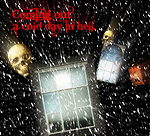 |
Why would I come out, when I only had hidden disabilities? What was I supposed to say to people: "Hey, you don't know this, but I'm crazy." I'd have to be crazy to do that. |
 |
My life is a "room" in which I dwell. It's been beaten down, battered and tattered.
I do leave the premises and enjoy the outside world, but I only stay out so long. Then
I return home where it's familiar, comfortable, albeit sometimes… unbearable.
|
 |
At their worst, neurological and mental disorders can make you feel like you've been stripped of your authentic self and replaced by a mere shadow… of your shadow. When it gets this bad, it can feel as though I inherited my genes from "someone" outside of my real family. |
 |
If you knew me, personally, you probably wouldn't see me as impaired as I sometimes feel. I don't appear crazy, but sometimes I have crazy ideas that can often be reframed as creative or epiphanies from the absolute. Ideas that are actually appreciated, if not admired by others. There is a thin wall however between my functioning on medication and not being able to function without medication. Can you imagine forgetting to get your prescriptions filled, only to see empty medicine containers in your cupboard? A very thin wall indeed. |
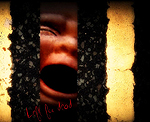 |
I was 16 years old in 1967. A friend of mine and I were crossing a street one warm summer night. We crossed against the streetlight and got trapped in the middle of two oncoming lanes of traffic. We waited until the light would turn green, so we could cross. Before that happened, a driver-- according to my friend (I was knocked unconscious), the driver was weaving in and out of traffic and struck me, in the process. The driver stopped, looked at me through his window, realized what he had done, and sped off. I was left for dead, I was alone in my unconsciousness-- abandoned. |
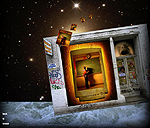 |
Those dreaded "Back to School" advertisements beginning in early August. My summers turned ethereal once I was reminded that I would soon be subject to boredom,
academic humiliation, rejection, isolation and a slowly dying
spirit. I had no control over the horrific situation, I
felt like an infant with no one to comfort me.
To this day, when I think of school in my youth, my mind
tiptoes back in time, trying not to wake the sleeping giants.
|
 |
I question why I was hit by a car and left for dead by a guy who didn't know how to drive. Bad Karma? Why didn't I die? Good Karma? Why did the accident cause me to have seizures and bipolar disorder? Bad Karma? How do I press on, despite my disabilities? "Drive". |
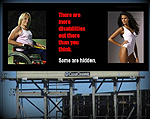 |
This visual is more of a Feingold "public service announcement" than it is an artistic expression. It is to teach and then remind us that not all disabilities are obvious. Which is more problematic: When your hidden disabilities are hidden from those around you or when they're hidden from yourself? |
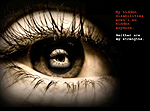 |
My hidden disabilities may not be as hidden (from myself and from others), but neither are my talents and particular abilities-- abilities such as being artistic, a creative problem solver, thinking outside the box, and keeping people on the edge of their seat, waiting for my circuitous explanations to make sense. My "inner eye" sees the world differently than does my other eye. It's a different kind of observation and vision-- more sensitive, intuitive and perceptive. People see my outer eye and if they look closely enough, they may see my inner one as well. And then sometimes it's hard to tell the difference |



